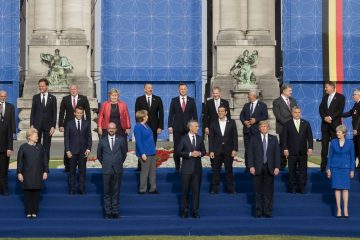Shinzo Abe or Abe Shinzo: From Western Order to International Order?
To what extent is the international community truly international? And, to what extent are non-Western norms and practices excluded? The choice of language in international relations is one important aspect of this broad topic. Each international organization has official languages. The United Nations, for example, has six official languages, and the European Union 24, though only three – English, French and German – are used in procedures of the Commission. The choice of language is partly driven by the need to communicate to the widest number of people, but it also has an endogenous relationship with state power. Powerful states promote the languages they use, and in turn, others must learn their languages to participate, propagating their power. An important aspect of the choice of …

London and the rest: regional transport disparities in the UK
Crossrail, still trumpeted as the largest construction project in Europe, and once held up as a paragon of a well-run, on-time and on-budget development, is now late and seriously over budget. Praise has been replaced by political infighting as the blame game gets into full swing and warnings that this will further imperil Transport for London’s (TFL) already shaky looking finances. However, hidden beneath the debris of mismanagement is something much worse: the willingness of the British government to plough vast sums into transport in London, whilst simultaneously underfunding transport in the rest of the country. Across the UK public transport has been de-regulated and privatised under policies originating in the 1980s, yet, London is a treated as a special …

Is Power Sharing a Solution to the Israeli-Palestinian Conflict?
The Israeli general election scheduled for 9th April is widely expected to be followed with the release of what has been termed the ‘Trump peace plan’ for the Israeli-Palestinian conflict. The release of the plan likely rests on the outcome of the election: if Benjamin Netanyahu’s Likud is not returned as the largest party with him as Prime Minister then the status of the plan is uncertain given that the Trump-Netanyahu relationship underpins it. However, who will win the election is far from certain, with the latest polling placing Likud in second place, but suggesting that the right-wing coalition headed by Netanyahu would retain a majority. Given the recent surprise announcement that the United States recognises the Israeli annexation of …

Japan’s aircraft carriers and the balance of naval capabilities in Asia
After much speculation about the future of the Japanese Navy, it was announced in early December that the Izumo-class helicopter carriers will be converted to aircraft carriers. This will require a substantial reconstruction of the two ships as well as the purchase of F‑35B fighter jets to comprise the carriers’ airwings. It is likely that 100 additional F-35 aircraft will be ordered to further bulk up Japanese aerial capabilities. This change is important for three reasons, firstly, Japan has not operated aircraft carriers since World War Two, secondly, they are being commissioned to contest increasing Chinese control of the northwest Pacific, and thirdly, because aircraft carriers are also under construction in the United States, Britain, China and India. We appear …

NATO, the Russian threat and defence spending
As expected, the recent NATO Summit was dominated by President Trump’s blunt criticisms of allies. He accused European member states of taking advantage of the United States, of failing to follow through on the 2014 agreement to raise defence spending to a minimum of 2% of GDP, and cozied up to Russia, perhaps most shockingly given the accusations levelled at his own campaign, of colluding with Russia. The basis for these accusations should be taken seriously, even if the latent threat of the United States withdrawing from NATO and the capricious means of delivery seem designed more to appeal to American domestic political interests than to truly illicit reform of the organisation. Cutting through the hyperbole, we see that there …










